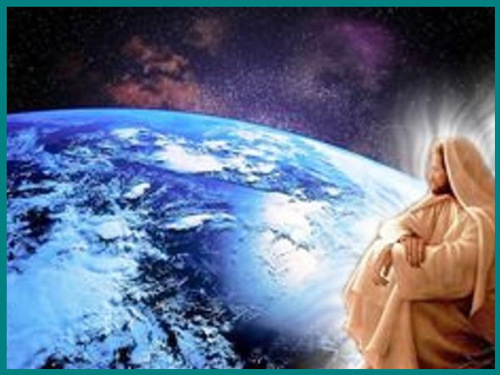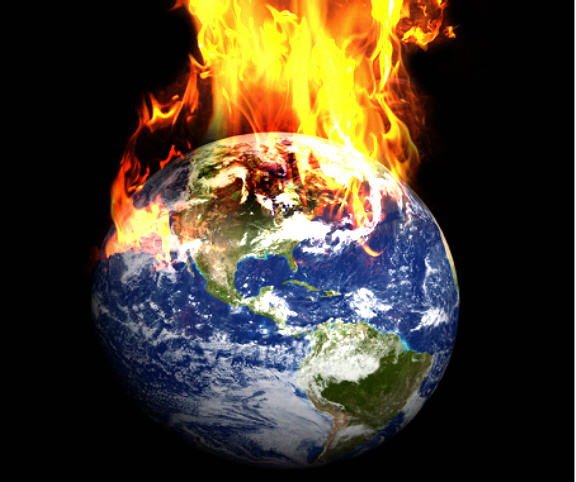The Lord spoke to Moses on Mount Sinai, saying: Speak to the people of Israel and say to them: When you enter the land that I am giving you, the land shall observe a sabbath for the Lord. Six years you shall sow your field, and six years you shall prune your vineyard, and gather in their yield; but in the seventh year there shall be a sabbath of complete rest for the land, a sabbath for the Lord: you shall not sow your field or prune your vineyard. [Leviticus 25:1-4]
[L] A reminder that God created the universe, that the earth is a gift from God. [R] Planet earth on fire.
Once in every seven years, Jews are called to celebrate a very unusual Shabbat. It is a Sahbatical Year, a Year of Shmita or Release.
On May 15-16 this year, using the traditional calendar of Torah reading, Jews will read the Torah portion (Lev. 25-27) that in full detail and spiritual explanation calls them to a seven-year cycle of letting the earth breathe freely for a year.
This Judeo-Christian Scripture calls on all to let the land rest and be released from all organized agriculture, and to share freely with each other and even with all animals what the land freely grows.
The underpinning logic rests on a fundamental faith in the doctrine of creation, that this earth is created by the Creator God based on a model of construction which culminates in Sabbath rest [Genesis 1].
The Torah is at once teaching us a spiritual orientation in two essential directions.
First, we must stop behaving as if we are the owners of this earth and exploit it like there is no tomorrow. Nobody “owns” any “property” at all: the only Owner is YHWH, the Breath and Spirit of all life – and we humans are but temporary leaseholders, stewards, caretakers. So the Torah sees to it that we take a mandatory seventh-year break, to let the earth take a rest, to recover from our inconsiderate exploitation, to breathe freely so as to heal again.
In the face of the severe climate change we are facing, and the growing ecological crisis in our generation, we ignore the inherent logic of Holy Scriptures at our great peril.
- Imagine the mad rush for fossil fuel. Lobbying companies pour tons of money into defeating any moves to curb its extraction and use. And yet, to preserve the vital functions of the earth, scientists warn that we have to put a ceiling on the amount of known reserve of fossil oil that we can burn. Beyond that, we would have crossed the point of no return in harming the earth irreparably.
- There is a big irony, for the more we burn the oil, the more the glaziers are melting. In turn, they become lakes, making the oil deposits lying beneath them even more accessible for extraction. This vicious cycle is harming the future generations in a way that is plain and visible for all to see.
Second, the symbolic language of the seven-day creation model of the first creation narrative in Genesis 1 ends on a day of divine rest. The underlying message is clear: creation leads to worship. Only when humanity takes a rest from its mad rush for profit, can it truly worship the Creator and the moral order He has put in place.
- To celebrate the Sabbath means to celebrate the covenant, that He is our God, and we are His people. In the Sabbath rest, we recognise again the universal equality of all humans. So worship has a moral aspect to it. God’s whole moral order has been taken up into it; only thus is it true worship.
- This is extended so that in every 7th year, a yearlong Sabbath may be kept when earth and human beings may rest, debts cancelled, purchases and sales annulled, and land and people set free.
- The command “to subdue the earth” in Genesis 1:28 shall not be turned into a blind and heartless culture of Christian exploitation that irreparably harms creation.
- To stop the ecological disaster becoming a graceless consequence of Christianity, and to refuse to employ science and technology to transform all powers of universe into utilitarian objects for human beings, to misuse plants and animals and all powers of earth for ideology of progress and for selfish ends, we must join our Jewish brethren in heeding the call of the seventh year sabbath.
In 2 Chronicles 36:21, we read about people having rejected God’s rest and peace and fell into the slavery of their activity.
And when the Torah asks, “What will happen if you refuse to let the land rest and celebrate this year of Shabbat?” the answer is that the land will rest anyway, on our heads, for there will then be flood and famine, exile and exhaustion, drought and disaster.
There is an on-going discussion happening around the globe today because of the climate crisis we are facing. The ancient warnings of Leviticus 26:18-20, 27-35, 43 have come alive in the predictions of modern scientists. Rabbi Arthur Waskow warns:
- Already, we find ourselves in the early stages of climate chaos: floods, rising sea levels, super-storms, years of unprecedented drought, earthquakes, waves of climate refugees and civil wars.
Those whom Waskow calls the “Carbon Pharaohs” will not let the Earth rest from the carbon dioxide, methane, and cancer-causing chemicals and asthma-causing coal dust we are pouring into air and water. They are bringing plagues upon the earth and human earthlings. Mother Earth cannot breathe; we are choking it. We must let it breathe again. The Jewish Shabbat of May 15-16 yields a powerful moment for all citizens of the earth, especially those descendants of the Abrahamic faith who take the Hebrew Scriptures seriously, to join forces in addressing the real biblical outcry for action to stop the “Carbon Pharaohs”.
The Torah [Deut 31:10-12] calls on us to assemble and learn together the heart of the Torah. Today, this means learning the Torah of eco-social justice, healing the earth and human earthlings from the lethal eco-crisis we are in, and birthing a new earth-wide community of shared and sustainable abundance.
But first, it begins with our individual eco-consciousness. Reciting article one of the Nicene-Constantinopolitan Creed every Sunday is a visible acceptance of the creation doctrine where the Creator is acknowledged. There is an obligatory creation ethic that comes with that belief. Far from understanding the command “to subdue the earth” as a command to exploit selfishly, it is a command to represent God, to live truly as having been made in His image, to steward well the creation He has placed in our care.
Copyright © Dr. Jeffrey & Angie Goh, May 2015. All rights reserved.
You are most welcome to respond to this post. Email your comments to jeffangiegoh@gmail.com. You can also be dialogue partners in this Ephphatha Coffee-Corner Ministry by sending us questions for discussion.


